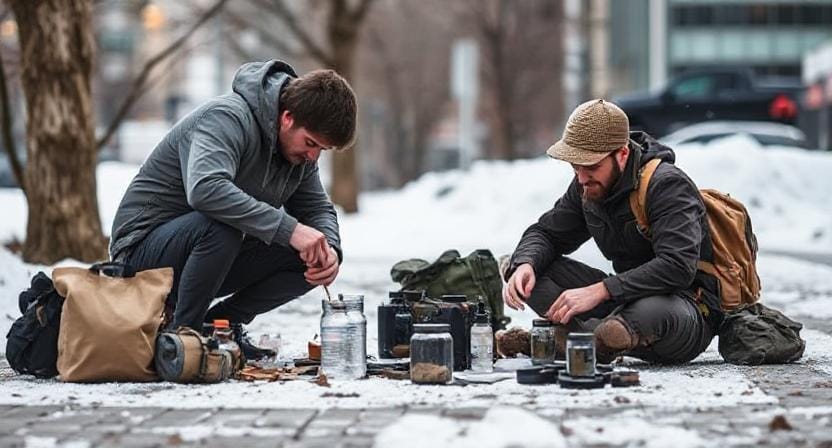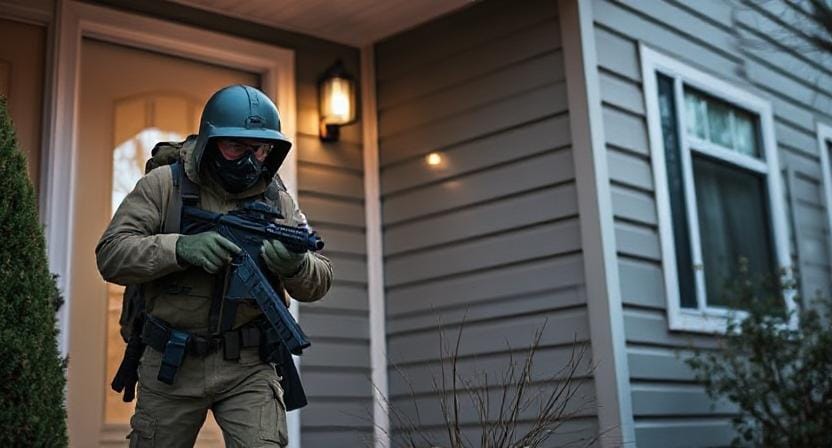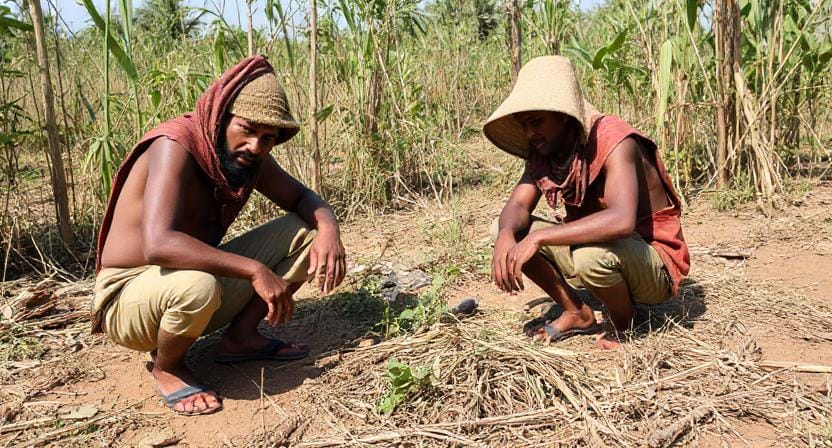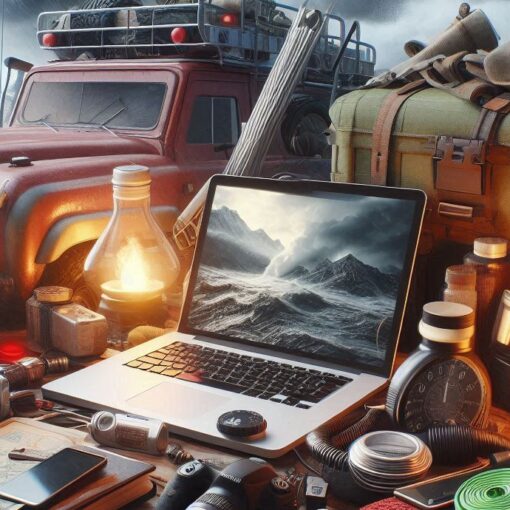Top Takeaways and Key Concepts
- Build a basic emergency kit with food, water, first aid, light, and essential tools.
- Strengthen home security using locks, cameras, and smart alerts to prevent threats.
- Stay connected with neighbors to share support, resources, and safety information.
- Create and practice emergency plans including communication, meeting points, and drills.
- Adopt self-reliance habits like growing food and using backup power for resilience.
Summary of This Article
This article explains how to prepare for urban emergencies by staying proactive, organized, and community-minded. It highlights the importance of building a city survival kit, improving home security, and creating strong neighborhood connections. Readers are encouraged to plan ahead with family communication strategies, practice emergency drills, and adopt sustainable habits like small-scale gardening and backup water solutions. Urban preparedness isn’t fear-based—it’s about confidence, teamwork, and readiness for everyday disruptions or major crises.
Short Video Version of this Article
Life in the city? It’s like a big game of Jenga. If you move just a little, everything could fall over, right?
Please Note: This post may contain affiliate links. If you click one of them, we may receive a commission at no extra cost to you. As an Amazon Associate, I earn from qualifying purchases.
With all the things going on outside—climate change, money problems, and that neighbor who thinks it’s absolutely fine to play bagpipes at two in the morning—it’s really vital to be ready for anything. I mean, who wants to be surprised?
So, how do we do well in this crazy world? Let’s talk about being ready for cities. It’s about being smart and prepared. You might think of it as your secret set of tools for living in the city.

Get some basic items first. You don’t need a lot. Just enough to keep you secure and comfortable. Water, food, and maybe a flashlight for when the power goes out. A proper first-aid kit can even save your life.
Also, look over your plans. What if something goes wrong? Have a friend system. Let someone know where you are. You want to know you can reach out if things go insane. It’s all about staying in touch.
And don’t forget about your neighborhood, either. Sharing what you know might be helpful at times. Working together with your neighbors can help you get through tough times. And you might get to meet that neighbor who likes bagpipes. Who knows? Instead of a complaint, maybe you’ll have a jam session!
As we get into this, remember that it’s okay to feel a bit overwhelmed. We are all in this together. We can go through city life without falling over like the unsteady Jenga tower if we have the correct attitude and do some planning. Take a deep breath, be ready, and have fun! 😊🏙️✨
Creating Your Urban Survival Kit

Let’s begin with the basics: your city survival pack. This is like your superhero utility belt, but without the spandex (unless you like that kind of thing).
You might think you don’t need one because you live near a Starbucks and a mall, but trust me, when the power goes out and all you have are stale muffins from last week’s brunch, you’ll wish you had stored up.
First, you need food and drink. You want things that won’t go bad and turn into school projects after a month. I love canned foods. Just make sure they aren’t old or dented. Unless you’re really up for an adventure at dinner, good luck!
Bottled water is helpful, but why not dream bigger? A good water filter or some tablets that clean the water can significantly help. I mean, who wants to drink from a puddle that might not be safe when things go wrong? Ew! Thinking ahead is part of being ready.
And things to use. Can we talk about some tools? Having a multi-tool is like having Batman’s utility belt. Really! You can fix things, open tough cans, and help when things become hard, like when your can opener suddenly goes missing. This can’t be the only time this has happened to me, right?
Life is a little easier when you keep everything together. Having clean water and healthy snacks makes you feel more in control. It’s like being your own superhero, ready for whatever the city throws at you. So pack wisely and relax! You can do this! 🌟💪🍽️
Home Security Measures

Keeping your home safe isn’t only about closing your doors at night and praying for the best. It’s a good idea to be proactive in today’s world. Have you ever seen an action movie where someone always seems to be caught off guard? Sure, let’s not be that person.
Think about putting up security cameras around your home. They can help keep people from doing bad things and also let you see if anything strange is going on (like your dog swiping food off the counter).
Smart home gadgets can be quite useful. Picture yourself sitting in that cozy café down the street, sipping on an expensive latte. Your phone suddenly buzzes, and it’s your door camera letting you know that someone is trying to get in. Oh no! You’d want to know straight away, wouldn’t you?
Another important thing is getting to know your neighbors. For real. In times of trouble, they can be your secret friends. Having someone nearby can make a huge difference if something goes wrong. They might even tell you some secret ways to keep those sly raccoons out of your trash cans at night. Who wants to deal with that mess, anyway?
And talking to your neighbors can be fun. You can share experiences and even host little block parties. It makes the community better. Picture a group of you sitting around, eating snacks, and talking to each other.
So, as you drink your latte, think about the digital assistance and nice people around you. They make living in the city a lot easier and a lot more entertaining. Let’s keep our relationships healthy and keep those annoying raccoons away! 🦝☕️💡
Building Community Connections

When it comes to neighbors, community ties are really important for being ready for anything. Let’s be honest: it’s hard to survive on your own. Even Bear Grylls would have a hard time without his camera team! Making friends with those around us gives us a support system that can aid us when things go wrong.
Join local groups that are focused on being ready or being eco-friendly. There is strength in numbers! Everyone benefits when people share things like gardening supplies or even skills like cooking or first aid.
And who knows? You might learn that your neighbor makes the tastiest bread from scratch. I mean, amazing bread can make a big difference. Think about that fragrance in the air. Bread that’s still warm? Yes, please!
Another enjoyable approach to meet people is to go to community activities. You can meet new people, and it’s a terrific way to get to know each other. Also, helping at places in your area is also gratifying. It just feels nice to help other people, right?
These gatherings aren’t merely about meeting new individuals. They are fun! You can talk about things you both like and have fun. Let’s be honest: everyone loves complimentary appetizers at parties. You can eat those while you talk. Imagine this: you meet someone new over some tasty cookies.
And who knows? You might even find a new pastime. There could be painting workshops, gardening groups, or literature clubs. It’s all about being active and having fun together. Your small part of the city can become a friendly neighborhood.
So, let’s jump into this together! Who wants some free food and bread? 🍞✨
Emergency Plans and Drills

Now let’s talk about emergency plans because winging it during a crisis rarely ends well—just ask anyone who tried making pancakes without reading the recipe first! Having clear plans ensures everyone knows what to do when disaster strikes.
Create family communication strategies so everyone knows where to meet if something goes wrong (and no arguing over whether it’s under the old oak tree or inside Grandma’s house!). Practice drills regularly; trust me—nothing brings family together quite like pretending there’s an earthquake while trying not to laugh hysterically at each other.
And speaking of practice, learning some basic first-aid skills is super helpful! You never know when someone might need it. Like, picture this: your friend trips over their own feet while trying to impress their crush. Ouch, right? It happens more often than you’d think!
Being ready can make a big difference. Just having simple skills can be a lifesaver. Band-Aids? Sure. But how about knowing how to treat a scrape or a bug bite? That’s gold.
Even simple things like knowing how to clean a cut or apply ice can help a lot. Talk about feeling like a superhero! It’s nice to be prepared. And honestly, it makes you feel good to help others.
Practice makes perfect, but it doesn’t need to be serious. You can check out fun classes or online videos. Make it a little project with friends. It’s nice to gather and learn together. Maybe a pizza party after your training session?
So, gear up! You never know when someone will need a helping hand. Just think how great it feels to be that friend who steps in when things go sideways!
Adapting Sustainability Practices

Adopting sustainable methods can also make cities much more ready for anything! Composting and recycling assist the world and make us less dependent on outside systems in case of an emergency.
It’s incredibly satisfying to grow your own herbs or vegetables! It may definitely make your day better, even if you only have a small place, like a windowsill. You want a fresh salad, and you can just reach over and grab some herbs you grew yourself. That is so cool! Plus, it saves you money, which is always a good thing.
Think about those grocery stores when you’re in a panic. Ugh! The throng and bare shelves can be very annoying. If you have your own little garden, you can bypass all that. Do you want fresh basil for your pasta? Yes, please. Or mint for your lemonade? So nice!
Let’s talk about energy as well. It’s a good idea to use renewable energy. If you’re thinking about getting solar panels, they might help keep your home operating when the electricity goes out. You don’t have to worry about losing power while you watch Netflix for hours on end. Picture being able to view your favorite shows without a worry in the world!
Even if it seems enormous and hard, starting small can help. You may start with simply a few herbs or some solar lights for your garden. You grow bit by little. It’s nice to be able to take care of yourself and be ready. You can also show your pals how good you are at gardening. Do you garden? Do you like to watch movies? That sounds great to me!
Conclusion: Embrace Preparedness as Part of Life
Urban preparedness isn’t just about lots of supplies and walls. It’s more about building strength in ourselves and with our neighbors. Life can be unpredictable. Knowing you’re ready can feel like a big hug on a tough day.
Start with small things. Maybe build a kit with food or water. It doesn’t have to be fancy. Just some essentials to make you feel secure. And don’t forget about your neighbors! Chat with them. Share tips. You never know when you might need a hand or a cup of sugar.
Think about it. A little community can go a long way. One neighbor might have a great idea about fixing things. Another might know a quick recipe for using up extra canned goods. Working together makes us all stronger.
Jump into life with both feet. Seriously, embrace the little things! Maybe stock up on some granola bars. You never know when a snack will save the day. Every adventure brings lessons, and trust me, I’ve learned this through more camping mishaps than I’d like to admit.
Life’s an adventure, so let’s be ready for whatever comes next. It’s better to be safe, right? Plus, those extra snacks can turn into fun gatherings, too!
Urban preparedness means being ready for power outages, natural disasters, or unexpected emergencies by building self-reliance, improving home safety, and staying connected with a local support network. With basic planning and simple tools, anyone can increase safety, reduce stress, and protect their family during urban disruptions.
Frequently Asked Questions
What should I include in a basic urban emergency kit?
A reliable urban emergency kit should include bottled water, non-perishable food, a first aid kit, flashlight, batteries, multi-tool, communication device, and personal hygiene items.
How much water should I store for emergencies?
Store at least one gallon of water per person per day for a minimum of three days, and more if possible for cooking, cleaning, and hydration.
How can I improve security in my home during a crisis?
Strengthen entry points with deadbolt locks, install security cameras or alarms, add outdoor lighting, and build trust with nearby neighbors for mutual safety checks.
Why is community connection important in urban emergencies?
Strong community connections provide shared resources, local support, safety awareness, and faster response in emergencies when professional help may be delayed.
How do I create a family emergency communication plan?
Set a designated meeting location, share emergency contacts, choose a communication method, and ensure every family member knows the plan and practices it regularly.
What tools are most useful for urban survival?
Useful tools include a multi-tool, flashlight, radio, duct tape, water filter, first aid supplies, and basic repair items for daily resilience and emergency repairs.
How can I be more self-reliant in the city?
Start by learning essential skills like basic repairs, first aid, food storage, small-space gardening, and using backup power options such as portable chargers or solar panels.
Suggested Resources:
Urban Survival Guide
https://www.survivalist.com/urban-survival-guide
Emergency Preparedness Tips
https://www.ready.gov/emergency-preparedness-tips
Community Resilience Initiatives
https://www.communityresilience.org

Kevin Collier is a seasoned outdoor enthusiast and writer for Trekbug.com, specializing in outdoor adventures, survival strategies, and prepping insights. With a deep love for nature and a commitment to self-sufficiency, Kevin empowers readers to embrace the wilderness confidently. He shares valuable tips, practical techniques, and inspiring stories, helping both novice and experienced adventurers develop essential skills for surviving and thriving in the great outdoors.





